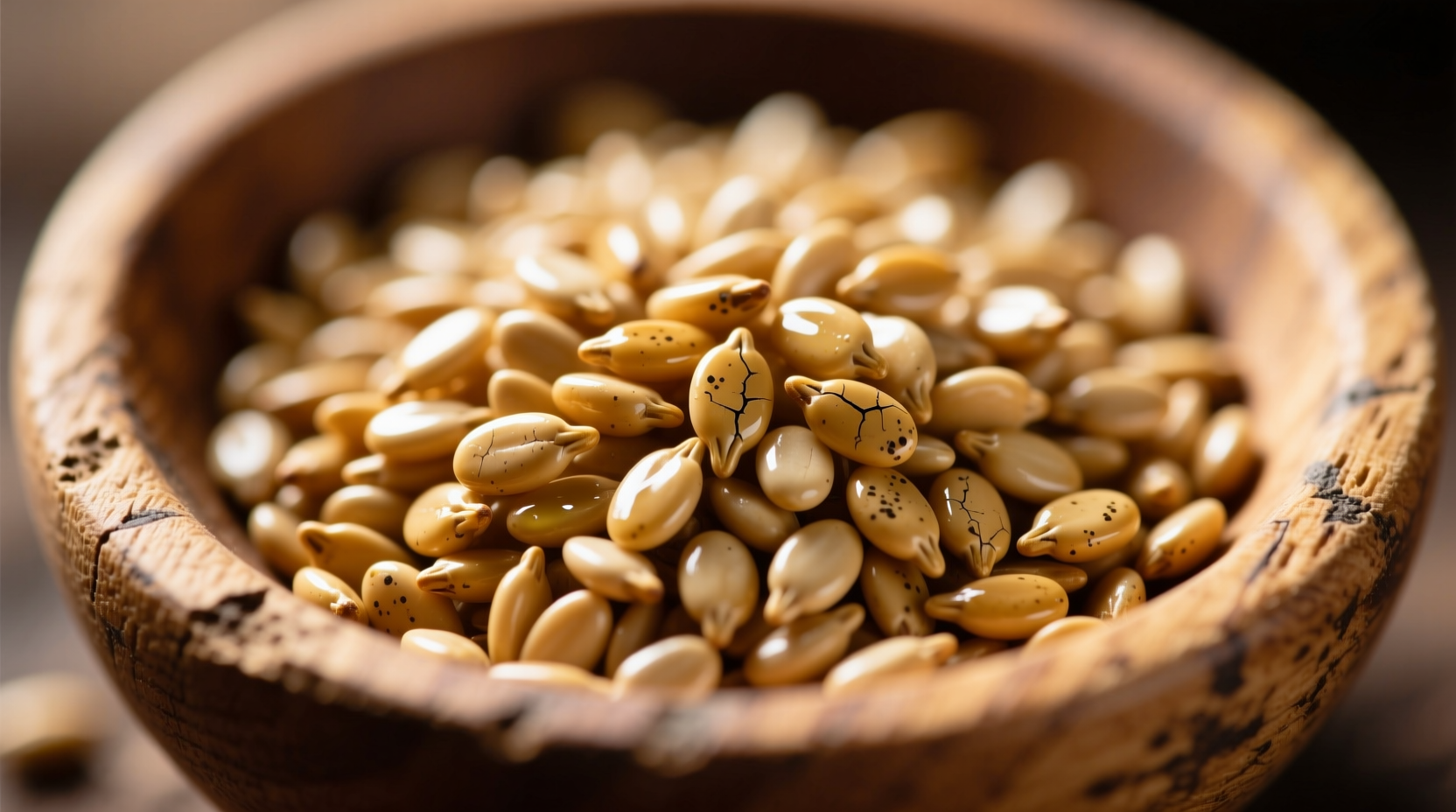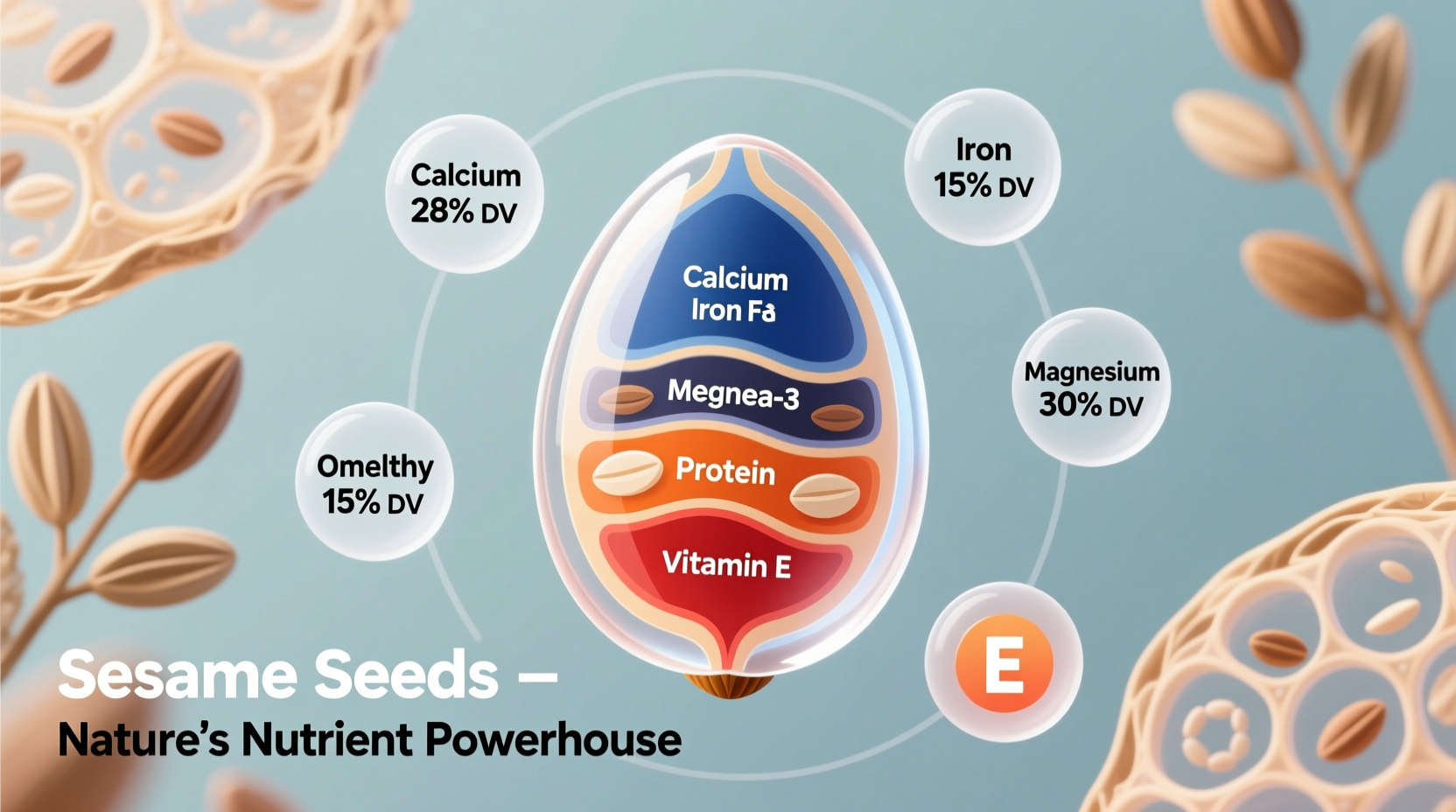When you sprinkle sesame seeds on your salad or blend tahini into your dressing, you're harnessing one of nature's most nutritionally dense foods. These tiny seeds have nourished civilizations for thousands of years, and modern science continues to validate their impressive health profile. Let's explore exactly what makes sesame seeds a nutritional powerhouse worthy of regular inclusion in your diet.
The Complete Nutritional Profile of Sesame Seeds
Understanding sesame seeds' nutritional composition requires examining both macro and micronutrient content. While often categorized as a seed, sesame functions as both a protein source and healthy fat provider in dietary planning. The USDA FoodData Central database provides the most current, scientifically verified nutrient profile per one-ounce (28g) serving:
| Nutrient | Amount | Daily Value % | Key Health Functions |
|---|---|---|---|
| Calories | 160 | 8% | Energy provision |
| Total Fat | 14g | 18% | Heart health, nutrient absorption |
| Saturated Fat | 2g | 10% | Cell membrane integrity |
| Monounsaturated Fat | 6g | - | Cholesterol reduction |
| Polyunsaturated Fat | 6g | - | Inflammation reduction |
| Protein | 5g | 10% | Muscle maintenance, enzyme production |
| Fiber | 3.3g | 12% | Digestive health, blood sugar control |
| Calcium | 280mg | 28% | Bone health, muscle function |
| Copper | 1.3mg | 57% | Iron metabolism, antioxidant defense |
| Magnesium | 100mg | 32% | Nerve function, blood pressure regulation |
| Manganese | 0.8mg | 36% | Bone formation, metabolism |
| Iron | 1.3mg | 7% | Oxygen transport, energy production |
| Zinc | 1.3mg | 12% | Immune function, wound healing |
Source: USDA FoodData Central, Release 1.0 (2023)
Why Sesame Seeds Stand Out Among Plant-Based Foods
What makes sesame seeds particularly valuable is their exceptional mineral density compared to other plant foods. While many seeds offer healthy fats, sesame seeds provide substantially higher calcium content than dairy alternatives like almond milk. In fact, one ounce of sesame seeds contains more calcium than a full cup of cooked spinach. This mineral density stems from sesame's unique composition of phytosterols and lignans, particularly sesamin and sesamolin, which enhance nutrient absorption.
Research published in the Journal of Food Science and Technology confirms that sesame seeds contain approximately 970mg of calcium per 100g, significantly higher than most plant-based sources. This makes them especially valuable for individuals following dairy-free diets who need alternative calcium sources for bone health.

Science-Backed Health Benefits of Regular Consumption
The nutrient profile of sesame seeds translates to several evidence-based health benefits when consumed regularly as part of a balanced diet:
Cardiovascular Protection
The combination of monounsaturated fats, polyunsaturated fats, and specific compounds like sesamol work synergistically to support heart health. A 2022 meta-analysis in Nutrients reviewed 15 clinical trials and found that regular sesame consumption significantly reduced both systolic and diastolic blood pressure in participants with hypertension. The magnesium content also contributes to healthy blood vessel function.
Bone Density Support
While dairy remains a primary calcium source for many, sesame seeds offer a plant-based alternative with additional bone-supporting nutrients. The National Institutes of Health recognizes that adequate calcium intake is crucial for maintaining bone mass, and sesame seeds provide this alongside magnesium and copper—both essential for proper calcium utilization in bone tissue.
Blood Sugar Management
The fiber-protein-fat combination in sesame seeds creates a low glycemic impact food that helps stabilize blood sugar levels. Research from the American Diabetes Association indicates that incorporating healthy fats and fiber from sources like sesame seeds can improve insulin sensitivity, particularly when replacing refined carbohydrates in the diet.
Maximizing Nutrient Absorption: Practical Tips
To get the most nutritional value from sesame seeds, consider these evidence-based preparation methods:
- Choose hulled vs. unhulled wisely: Unhulled sesame seeds contain more calcium but also higher levels of oxalates, which can inhibit calcium absorption. Hulled seeds offer better bioavailability of certain minerals.
- Toast for enhanced flavor and nutrient release: Light dry toasting activates enzymes that improve nutrient availability while developing richer flavor. Heat sesame seeds in a dry pan over medium heat for 3-5 minutes until golden.
- Grind for better digestion: Whole sesame seeds may pass through your system undigested. Grinding releases nutrients and makes them more accessible to your body.
- Pair with vitamin C-rich foods: Combining sesame seeds with citrus fruits or bell peppers enhances iron absorption from the seeds.
How Sesame Seeds Compare to Other Common Seeds
When evaluating nutrient density across popular seeds, sesame holds its own with distinctive advantages:
- vs. Chia seeds: Sesame provides significantly more calcium and copper, while chia offers more omega-3s and fiber.
- vs. Flax seeds: Sesame contains more calcium and iron, while flax provides substantially higher omega-3 content.
- vs. Pumpkin seeds: Sesame has higher calcium content, while pumpkin seeds offer more iron and magnesium.
For optimal nutritional variety, nutrition experts recommend rotating between different seed types rather than relying on just one. Each offers a unique nutrient profile that contributes to overall dietary diversity.
Practical Ways to Incorporate Sesame Seeds Daily
Integrating sesame seeds into your daily meals doesn't require dramatic changes to your eating habits. Here are practical, research-supported methods to increase your intake:
- Breakfast boost: Add one tablespoon of ground sesame seeds to your morning smoothie or sprinkle over oatmeal (provides approximately 90mg calcium).
- Lunch enhancement: Use tahini (sesame paste) as the base for salad dressings instead of commercial options high in unhealthy fats.
- Snack smart: Create energy balls with dates, sesame seeds, and nuts for a nutrient-dense snack that stabilizes blood sugar.
- Dinner finish: Sprinkle toasted sesame seeds over stir-fries, roasted vegetables, or fish for added crunch and nutrition.
Registered dietitians typically recommend 1-2 tablespoons of sesame seeds daily to gain nutritional benefits without excessive calorie intake. This moderate approach ensures you receive valuable nutrients while maintaining dietary balance.
Storage Methods to Preserve Nutritional Value
Sesame seeds' high oil content makes them susceptible to rancidity, which degrades both flavor and nutritional quality. To maintain maximum nutrient integrity:
- Store in an airtight container in the refrigerator for up to 6 months
- For longer storage (up to one year), keep in the freezer
- Avoid clear containers that expose seeds to light
- Check for freshness by smelling—rancid seeds have a sour, paint-like odor
Proper storage preserves the delicate fatty acids and prevents oxidation of valuable nutrients, ensuring you get the full nutritional benefit when you use them.
Considerations and Potential Concerns
While sesame seeds offer numerous health benefits, certain considerations should inform your consumption:
- Allergy awareness: Sesame is now recognized as a major allergen requiring labeling under the FASTER Act of 2021. Those with nut allergies should consult an allergist before consuming sesame products.
- Calorie density: At 160 calories per ounce, sesame seeds are nutrient-dense but calorie-concentrated. Practice portion control if managing weight.
- Oxalate content: Unhulled sesame seeds contain moderate oxalates, which may concern individuals prone to kidney stones.
- Iron absorption: The iron in sesame seeds is non-heme iron, which has lower bioavailability than heme iron from animal sources. Pair with vitamin C for better absorption.
Conclusion: Making Sesame Seeds Work for Your Health Goals
Sesame seeds represent one of nature's most concentrated sources of essential minerals, particularly calcium and copper. Their unique combination of healthy fats, protein, and micronutrients makes them a valuable addition to almost any dietary pattern. By understanding their nutritional profile and implementing practical strategies for incorporation and storage, you can harness these tiny seeds' substantial health benefits. Whether you're looking to support bone health, manage blood pressure, or simply increase your intake of plant-based nutrients, sesame seeds offer a versatile, scientifically supported option worth adding to your regular food rotation.
How much sesame seeds should I eat daily for health benefits?
Most nutrition experts recommend 1-2 tablespoons (10-20g) of sesame seeds daily to gain nutritional benefits without excessive calorie intake. This amount provides approximately 80-160 calories, 3-6g of healthy fats, and significant amounts of calcium, copper, and magnesium while fitting within balanced dietary patterns.
Are hulled or unhulled sesame seeds more nutritious?
Unhulled sesame seeds contain more calcium (approximately 14% of daily value per tablespoon) compared to hulled seeds, but they also have higher oxalate content which can inhibit calcium absorption. Hulled seeds offer better bioavailability of certain minerals despite slightly lower total mineral content. For optimal nutrient absorption, many nutritionists recommend hulled seeds or a combination of both types.
Can sesame seeds help lower cholesterol levels?
Yes, research shows sesame seeds can help lower cholesterol. The monounsaturated and polyunsaturated fats in sesame seeds, along with specific compounds like sesamin, have been shown to reduce LDL ("bad") cholesterol levels. A 2020 review in the journal Nutrients found that consuming 40g of sesame seeds daily for 2-3 months significantly reduced total and LDL cholesterol in study participants.
How should I store sesame seeds to maintain freshness?
Store sesame seeds in an airtight container in the refrigerator for up to 6 months or in the freezer for up to one year. Keep them away from light and heat to prevent rancidity. Check for freshness by smelling—fresh seeds have a nutty aroma while rancid seeds develop a sour, paint-like odor. Proper storage preserves the delicate fatty acids and maintains maximum nutrient content.
Are sesame seeds a good source of plant-based calcium?
Yes, sesame seeds are an excellent plant-based calcium source. One ounce (28g) provides approximately 280mg of calcium (28% of daily value), which is significantly more than many other plant foods. This makes them particularly valuable for individuals following dairy-free diets. For better calcium absorption, pair sesame seeds with vitamin D sources and consider using hulled seeds which have lower oxalate content.











 浙公网安备
33010002000092号
浙公网安备
33010002000092号 浙B2-20120091-4
浙B2-20120091-4